|
Click pictures for a larger version.
UPDATE!
Ruger has introduced a six-shot version of the LCR,
chambered in 327 Federal Magnum.
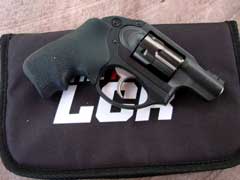
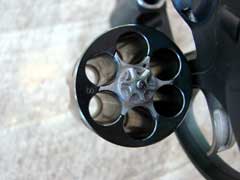
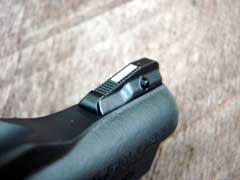
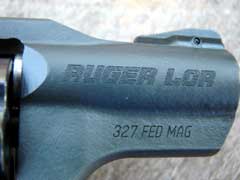
  
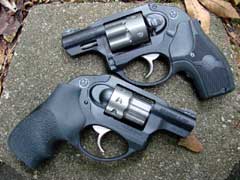
Ruger LCRs: 38 Special (top), 22 LR (bottom).
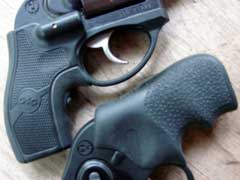
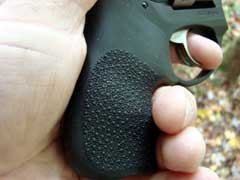
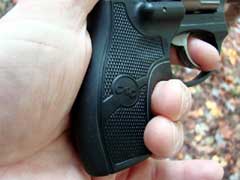
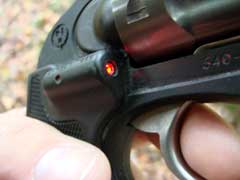
All Ruger LCR revolvers are available with Hogue
Tamer synthetic rubber or Crimson Trace lasergrips.
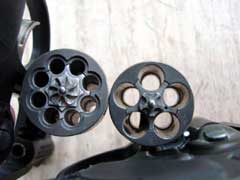
|
|
It has been almost four years since I was
introduced to Ruger’s then-new polymer-framed LCR revolver at
the New Hampshire factory. When I first heard of the compact
polymer revolver, I wasn’t too keen on the idea, thinking that
it was a traditional-styled revolver, using polymer instead of
steel for the frame. However, the design is like nothing that
preceded it, using a combination of aluminum, steel, and
polymer, along with a trigger mechanism that is unlike any
other. The LCR has a concealed hammer, along with a trigger
geometry that results in a butter-smooth double-action trigger
pull. The unique features of the LCR are highlighted in my
earlier reviews of these guns, so here we will concentrate upon
the usefulness and advantages of carrying a revolver, and also
upon the advantages of having a 22 Long Rifle version as both a
trail gun and as an understudy to your center fire defensive
revolver.
There was a time when most who carried a
pocket gun chose a revolver over a semi-auto. Today, the
semi-auto has gained in popularity, due to their light weight,
improved reliability, small size, and lower cost. Still, the
revolver is an excellent choice for concealed carry, whether in
the pocket or in a holster. A lightweight, compact revolver such
as the LCR carries very well. The hammer is concealed, offering
a snag-proof draw, and the enclosed action also keeps debris
from entering the innards of the weapon. A revolver also has the
unique advantage of being capable of being fired from within a
jacket pocket, if necessary. Doing so with a semi-auto will
result in a malfunction, but the LCR and other enclosed-hammer
revolvers can do so without a problem. Another great advantage
of a revolver is that the manual of arms is much simpler and
easy to understand, even for a beginner. Many gun trainers and
professionals forget that most folks who carry a firearm for
protection are not really “gun people”. They do not eat,
sleep, and breathe guns as some of us do. To these folks, the
gun is merely a tool. They want one around to protect themselves
and their families, they want it to work when needed, but they
do not obsess with its design nor its function. They simply want
the weapon to fire when needed, without a lot of complication.
For those who desire these attributes in a firearm, the revolver
is as simple as it gets, from a user’s perspective. The
revolver is easy to load, easy to unload, and easy to determine
whether or not it is loaded, after only minimal instruction.
A double-action, concealed-hammer revolver
such as the LCR is also as simple to fire as any gun can be. The
only operation necessary is to simply pull the trigger. Doing so
repeatedly will continue to fire the weapon until it is empty.
The weapon is also easy to load, and to unload. If a cartridge
fails to fire, for whatever reason, pulling the trigger again
will fire the next cartridge in the cylinder, with no need to
manipulate the weapon in any other manner.
The Ruger LCR is currently available in three
chambering, with advantages unique to each. The first offered
was the 38 Special Plus P version,
which I suspect is also the most popular thus far. The 38
Special, loaded with five high-performance hollow points, will
easily handle most unpleasant social conflicts, according to FBI
gunfight statistics. If more power is needed, the
LCR is also offered in a 357 Magnum version, which will also
fire 38 Special ammunition, and it makes a great 38 Special for
those who want a little more weight in their handgun, as the 38
version is pretty light weight, weighing in at about 13 ounces,
depending upon the exact variation chosen. The 357 Magnum LCR
weighs about four ounces more, which helps to tame the felt
recoil a bit. One of my favorites of
the LCR revolvers is the 22 Long Rifle version. While the
center fire LCR revolvers carry five cartridges in the cylinder,
the 22 rimfire has a capacity of eight. I have often recommended
the 22 LCR to those who, for whatever reason, cannot handle the
recoil of the larger calibers. While a 22 would not be my first
choice going into a fight, I certainly would not feel unarmed.
The little cartridge has much more power than most “experts”
will admit, and it is easy to put those bullets on target
quickly, due to the light recoil and smooth action of the LCR.
Loaded with forty grain hollow point ammunition such as CCI
Velocitor, the 22 LCR is an effective deterrent to an attack.
While there are other 22 revolvers on the market, it is hard to
find one with a trigger pull as light and smooth as is found on
the LCR. The LCR trigger pull, grip shape, weight, feel, and
accuracy of the 22 LCR closely mimics the 38 and 357 LCR
revolvers, which brings us to another important use of the 22
version, as an understudy for the center fire weapons.
While many who choose to go heeled carry a
compact 38 or 357 revolver, they seldom practice enough with
that weapon to become proficient in its use. The 22 LCR is to
the 38 LCR what a 22 Long Rifle AR-15 is to a center fire AR-15.
Cost of ammunition, recoil, and muzzle blast sometimes keeps
owners of compact revolvers from practicing as much as they
should. A compact, short-barreled handgun is harder to shoot
accurately for most of us, compared to a larger handgun, but
when trouble finds us, we are much more likely to have the
pocket gun with us than something larger. If you carry a compact
handgun for defense, practice is a must, and a 22 version of
your carry gun is an ideal way to get in many hours of fun,
economical practice. I carry Buffalo Bore Lead Free in my 38
LCR, as I want the absolute best ammo available for defense, but
it costs about a dollar and seventy-five cents per pop. The cost
is well worth it for how it performs, but I would not want to
shoot huge quantities for practice. Good practice ammo for the
38 Special costs about 30 cents per round, which is some
cheaper, but still not inexpensive. Good 22 Long Rifle ammo
costs only 4 cents per round. I can shoot all day long with the
22 LCR for about the same cost as a twenty-round box of good
hollow point defensive ammo for the 38 Special. You can get some
benefit from dry-firing a center fire revolver, but to learn
good trigger control, you need to be shooting on target. The 22
allows for easy-shooting practice with minimal recoil and muzzle
blast. I also like that Ruger offers the 22 LCR with Crimson
Trace Lasergrips, just as they do for the center fire LCR
revolvers, so no matter which grip or sighing system you have on
your defensive handgun, the practice handgun will have the exact
same grip feel, greatly enhancing the usefulness of the practice
session. Some people balk at the idea of paying the same amount
of money for a rimfire revolver as for a center fire, but when
the quality and workmanship is the same, one costs just as much
to manufacture as does the other. However, the cost savings add
up quickly if you do the amount of practice that you should be
doing with your defensive handgun. The cost savings on ammo will
quickly pay for the purchase of the 22 LCR, and you then have
two revolvers instead of one, and you will also be much more
proficient in their use. The 22 LCR can also serve double duty
not only as an understudy to the 38, but is also an effective
and reliable trail pistol for use in the woods, or as a trainer
for new shooters, to get them accustomed to firing a revolver
without the distractions of recoil and muzzle blast. The 22 LCR
can also use the same holster as your center fire LCR.
For details, velocities, and accuracy
specifications on these LCR revolvers, I refer you to my
previous reviews. The Ruger LCR revolvers are reliable,
accurate, compact, light weight, built right, and built in the
USA.
For more information on the
extensive line of Ruger firearms and accessories, go to www.ruger.com.
For the location of a Ruger
dealer near you, click on the DEALER FINDER at www.lipseys.com.
To order a Ruger firearm
online, go to www.galleryofguns.com.
To order quality ammunition
online, go to www.buffalobore.com,
www.doubletapammo.com,
www.theamericanmarksman.com,
and www.luckygunner.com.
Jeff Quinn
  
Got something to say about this article?
Want to agree (or disagree) with it? Click the following link to
go to the GUNBlast Feedback Page.
|
|
Click pictures for a larger version.
UPDATE!
Ruger has introduced a six-shot version of the LCR,
chambered in 327 Federal Magnum.
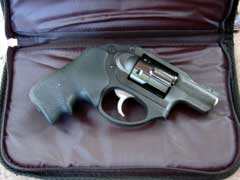
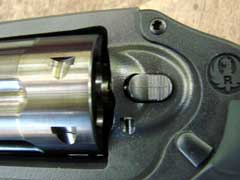
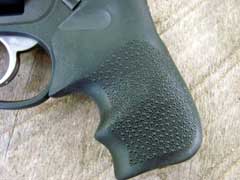
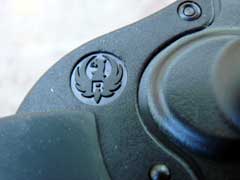
  
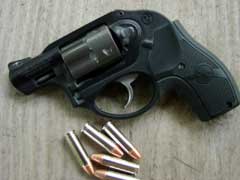
LCR 38 Special.
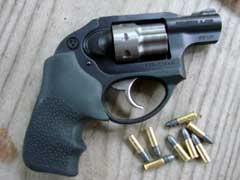
LCR 22 Long Rifle.
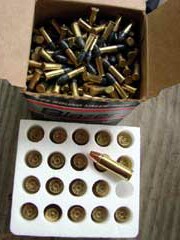
A 525-round box of 22 LR costs about the same as a
20-round box of premium hollowpoint 38 Special ammunition.
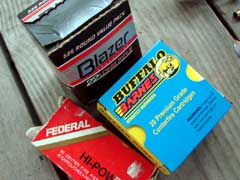
525 rounds of 22 LR, 50 rounds of target 38, and 12
rounds of the best hollowpoints each cost about the same.
|
![]()